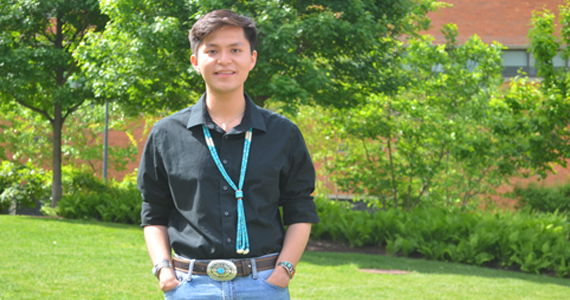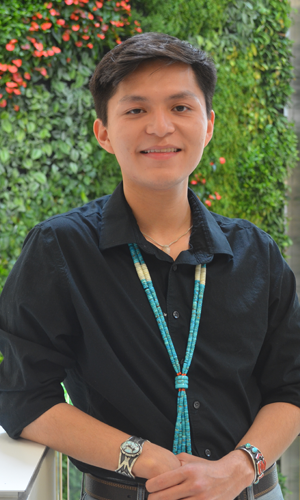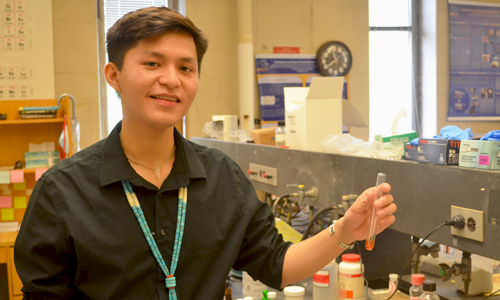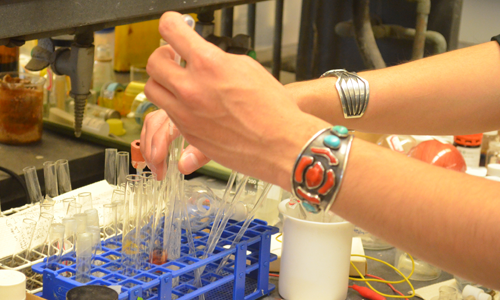Sky's the Limit
By Erica Levi Zelinger

College of Arts & Sciences and Pennoni Honors College student Sky Harper receives both the prestigious Goldwater and Udall Fellowships. He is a first-generation student from the Navajo Nation in Ram Pasture, Arizona.
May 17, 2022
Mother Earth will always support you wherever you walk. That’s what Sky Harper’s own mother and grandparents taught him. Always remember your family and where you come from. And when you’re making mush, always find the balance between your blue cornmeal and juniper ash or the sweetness and starchiness of the cornmeal won’t neutralize the bitterness of the ash.
As a child growing up on the Navajo reservation in Ram Pasture, Arizona, Sky, chemistry ’24, Honors, loved to listen to the lore of his elders and cook with his mother. He’d wonder while stirring a pot on the stove why the ingredients were reacting the way they were. Sky began to fuse the stories and teachings of his culture, the plaguing issues in his community and modern science with his enthusiasm for chemistry and his devotion to Native American healthcare.
Well into his college career, Sky has seamlessly woven the Indigenous narratives of his ancestors into his research, his thought process and even the applications that recently garnered the College of Arts & Sciences and Pennoni Honors College student both the prestigious Goldwater and Udall Fellowships.
The Goldwater Scholarship recognizes 400 undergraduates in science, math, and engineering fields across the United States, planning to pursue research careers and provides funding for undergraduate study. The Udall is awarded to 50 students committed to careers related to the environment, tribal public policy, or Native American healthcare. Sky is Drexel’s first-ever nominee and recipient in the field of Native American healthcare.
Heading into midterms — that long stretch from Week 3 to Week 8 — Sky hasn’t had much time to process the significance of this achievement.

“I’m in shock — I’m not processing it,” he says. “With Drexel’s schedule just going on and on — I don’t have time to think about getting these scholarships. I’m a first-generation college student and I’m here to achieve new accomplishments for my family. Not a lot of students get these scholarships. Even fewer receive two of them. I want to show my brothers — ‘you are capable.’”
Because that’s the mantra that has been bestowed upon him by his high school chemistry teacher, Ms. Flores, and professional mentors, Leona Anderson of Boeing, Dr. Daniel Winarski of IBM and Drs. Andrew Gehring, Christopher Clarke and Jenny Allen at the United States Department of Agriculture — Agricultural Research Services, where he’s been employed since graduating high school, conducting research.
But long before Sky ever set foot on the Drexel campus — which, because of COVID, wasn’t actually until his second term — he took this advice from his mother: Learn to speak for yourself and make it happen.
When he was 17 and at the biggest pre-college international science fair in the world, Sky explained his research detailing the creation of a reactor that synthesized glucose with non-organic compounds — photosynthesis without the plant!
The scientists in white coats surveyed Sky’s poster. They raised their clipboards, fired off questions and jotted down notes.
“Where are you interested in attending college? Would you prefer a city school or suburban campus? Something small, medium-sized or large?”
And then moved onto the next student in the Phoenix convention center hall.
Just days before, his mother had used her entire paycheck from a substitute teaching gig at Sky’s high school — Navajo Preparatory boarding school — in New Mexico to pay to have his poster printed in town for the Intel International Science and Engineering Fair. He always wants to be an example for his five younger brothers.
At the science fair’s awards ceremony, he sat among other students, chatting it up, only half-listening and no longer thinking about the line of questions. From the microphone came an announcement that of the 2,000 students there, Drexel University (he had no idea where Drexel was) eight students were awarded full scholarships for projects matching the University curriculum. “Sky Harbor,” he thought he heard them say, and he wondered what the Phoenix airport had to do with Drexel — until his name flashed on screen.
“I am pretty sure I heard my mom screaming from the back of the convention center,” he says.
Though he could have applied elsewhere, he was floored that Drexel offered him a full ride even before applying. “That was Drexel saying, ‘We are going to fully invest in you as a student. They were the first one to say I was worth it. And I felt like I earned it.”
So, he came to Drexel. But not without doing his research.

He investigated the many programs and initiatives of Pennoni Honors College. He applied and was accepted to the Honors Program. Same with Undergraduate Research & Enrichment Program’s (UREP) STAR Scholars Program, which allowed him to study the in-situ polymerization of acrylic acid with dielectric barrier discharge-based plasma with Dr. Haifeng Ji.
“The best thing I did for myself was become involved on campus immediately,” Sky says. He continued research through UREP, becoming a SuperNova Undergraduate Research Fellow and working on a vertically integrated project with Dr. John Medaglia in the Cognitive Neuroengineering & Wellbeing Laboratory. He participated in UREP’s Aspire Scholars program, to help develop and clarify his career goals. He’s a Louis Stokes Alliance for Minority Participation ambassador, plays volleyball with the chem majors, and with a knack for storytelling, he’s shared his writing on stage at The Moth and with the Philadelphia Theatre Company.
“We joke that Sky is a ‘frequent flyer’ at UREP because he’s involved with so many of our programs,” says UREP associate director Leah Gates. “But it means we’ve gotten to support him in a lot of different modes of growth, which is really satisfying. Our goal is to assist students in developing and integrating the skills of curiosity and reflection, and we’ve really gotten to see that process bear fruit for Sky.”
She adds, “We’re always trying to remind Sky that he doesn’t have to do everything, he doesn’t have to always say yes … he sometimes pushes himself too hard, perhaps because he feels such a strong obligation to perform well as a role model for other aspiring Indigenous scientists.”
In fact, when Sky first got to Drexel, he studied DragonLink to see what organizations existed on campus for Indigenous people and when he didn’t find any, he started one. There are less than 10 students on the Drexel campus who self-identify as Native American; Sky is the only one in STEM.
“One of my biggest challenges is the expectation of me to represent all Indigenous people, but I can’t fully represent other tribes. We’re all unique — from our traditions to our daily walks of life.

Among the challenges of the fellowship application process, Sky admits, was switching gears from writing technical lab reports to writing reflective applications, highlighting his culture and his accomplishments.
The process has helped refine his writing skills by reflecting on experiences gained. He’s further developed his goals and has a clearer picture of the route he wants to take to an MD/PhD program.
“I knew what I wanted to do but the steps to get there seemed complicated — I was passionate about research and my community but didn’t know how it would translate to my career.”
As a four-year, one co-op student, Sky wasn’t sure if he should pursue employment in medicine, research or industry for his co-op, but fellowship advising has helped define his path.
“I learned that the National Institutes of Health has an MD/PhD program at Oxford and Cambridge. But then I learned that NIH prefers you have prior experience at NIH. So now I’m applying for a program at NIH.”
And every application builds upon the last.